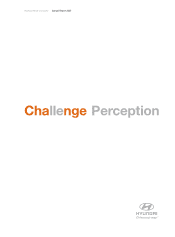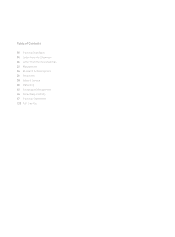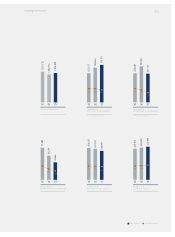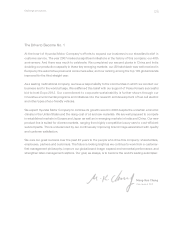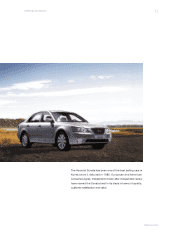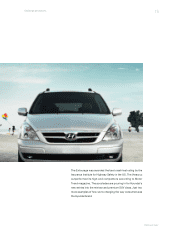Hyundai 2007 Annual Report Download - page 9
Download and view the complete annual report
Please find page 9 of the 2007 Hyundai annual report below. You can navigate through the pages in the report by either clicking on the pages listed below, or by using the keyword search tool below to find specific information within the annual report.
07
Challenge perceptions
(3) The collective wage agreement reached between labor and management was a milestone for Hyundai
Motor Company and indeed for any Korean company. The agreement ensures our competitiveness in the
global market for years to come.
(4) The numbers tell the story: 624,227 cars sold domestically; 1,076,070 cars sold internationally;
domestic production reached 1,706,727 units; overseas production reached 911,342 units; and overall
production in 2007 was up 4.4 percent from 2006.
The economy in 2008 is shaping up to be one of both uncertainty and opportunity. The domestic price of
oil is topping US$100 per barrel; the US housing market continues to decline; and major stock markets
are wavering. The shaky economic climate in the US is being felt around the world. The auto industry is
certainly being transformed, with US carmakers losing market share to emerging Chinese and Indian
competitors. Amidst this uncertainty, Hyundai Motor Company is well positioned to challenge the top
carmakers and compete on quality and brand recognition.
The year 2008 has had a promising start: We aim to sell 670,000 units domestically and 1,130,000 units
are to be exported; 1,800,000 units are to be produced domestically and 1,310,000 units are to be built
overseas. These figures represent an 18.8 percent increase over the previous year, with total production
target reaching 3,110,000 units.
Our goal is to defend our strong presence in the Korean market while expanding in key foreign markets. In
our soon-to-be completed plant in the Czech Republic, we will begin mass production of the i30 in 2009
to meet growing European demand. In India, we’ve opened the doors to a second mass production
facility for subcompact and compact cars destined for worldwide export. This will be followed by a
second production facility in China and a first in Russia, as part of our strategy for the important Brazil-
Russia-India-China (BRIC) market. At home and in the US, the launch of the Hyundai Genesis will mark
our entry into the premium sedan class.
By targeting key markets and prioritizing customer satisfaction, Hyundai Motor Company is prepared to
face the economic uncertainties and embrace the opportunities in the coming year and beyond. As
always, we do so with the steadfast support of the diverse people who drive this company forward: our
shareholders, employees, partners and customers. To them I say thank you.
Dr Dong-Jin Kim
Vice Chairman & CEO

